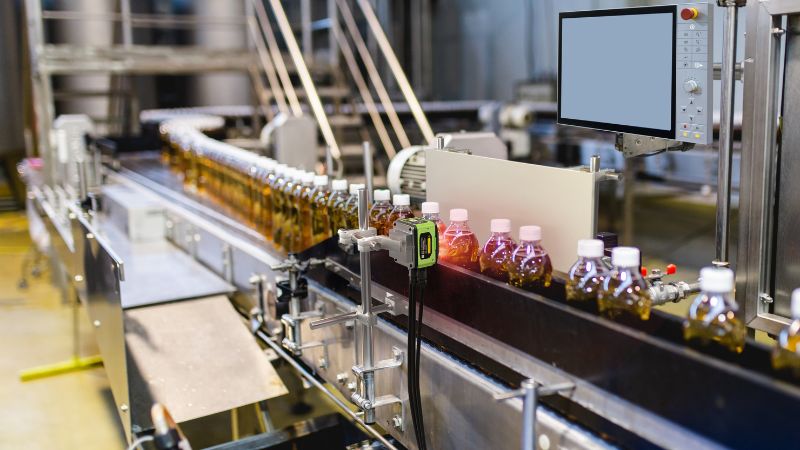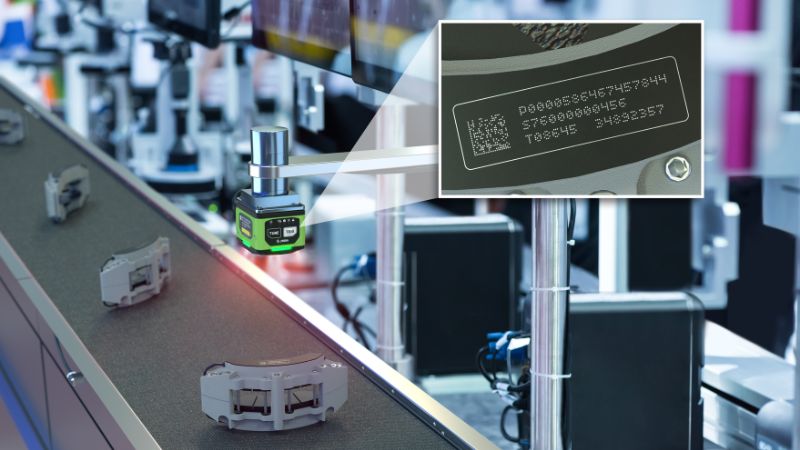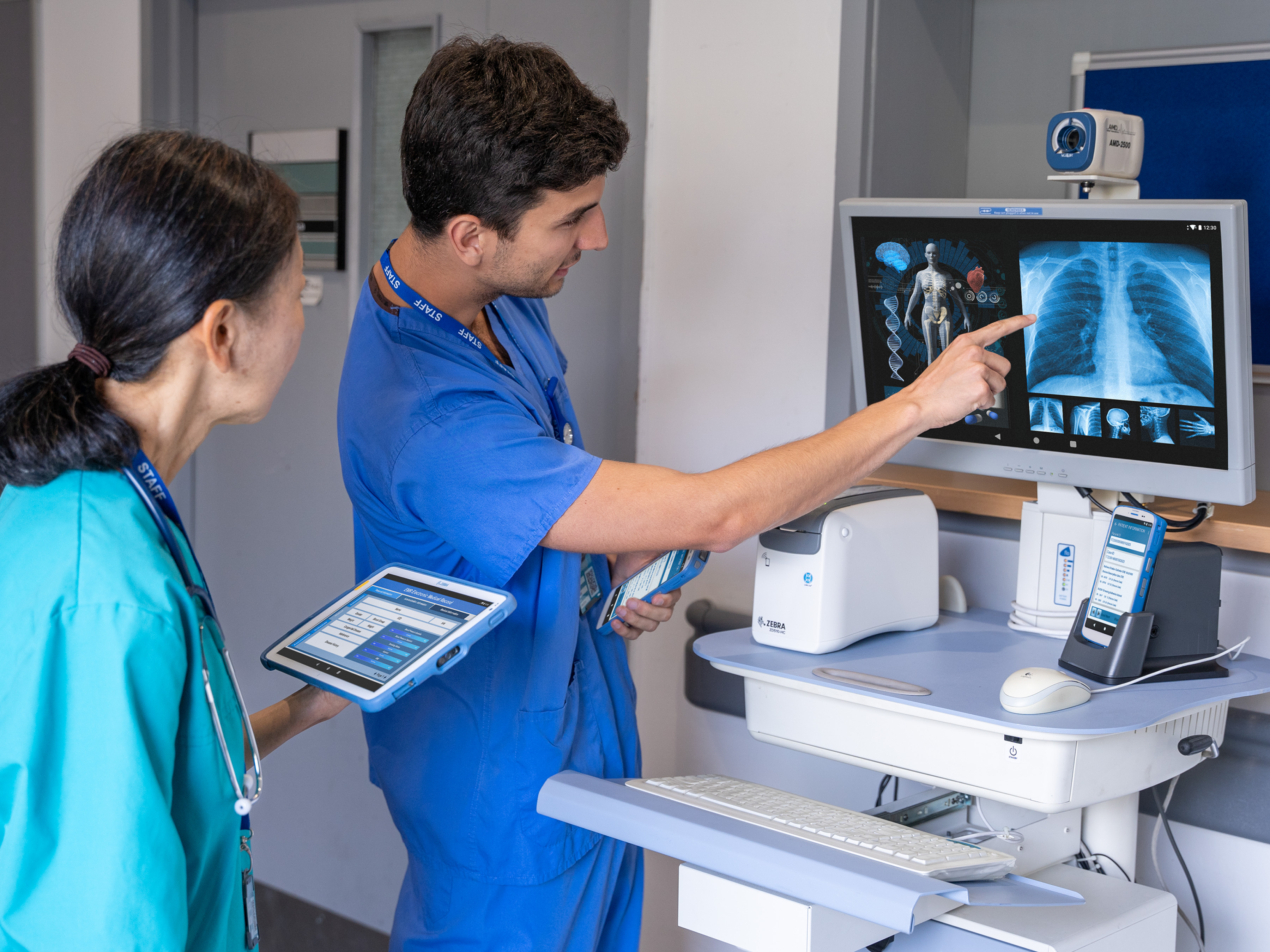Transform retail operations with Zebra’s retail technology solutions, featuring hardware and software for improving inventory management and empowering teams.
Streamline operations with Zebra’s healthcare technology solutions, featuring hardware and software to improve staff collaboration and optimise workflows.
Enhance processes with Zebra’s manufacturing technology solutions, featuring hardware and software for automation, data analysis, and factory connectivity.
Zebra’s transportation and logistics technology solutions feature hardware and software for enhancing route planning, visibility, and automating processes.
Zebra's hospitality technology solutions equip your hotel and restaurant staff to deliver superior customer and guest service through inventory tracking and more.
Zebra's market-leading solutions and products improve customer satisfaction with a lower cost per interaction by keeping service representatives connected with colleagues, customers, management and the tools they use to satisfy customers across the supply chain.
Empower your field workers with purpose-driven mobile technology solutions to help them capture and share critical data in any environment.
Zebra's range of mobile computers equip your workforce with the devices they need from handhelds and tablets to wearables and vehicle-mounted computers.
Zebra's desktop, mobile, industrial, and portable printers for barcode labels, receipts, RFID tags and cards give you smarter ways to track and manage assets.
Zebra's 1D and 2D corded and cordless barcode scanners anticipate any scanning challenge in a variety of environments, whether retail, healthcare, T&L or manufacturing.
Zebra's extensive range of RAIN RFID readers, antennas, and printers give you consistent and accurate tracking.
Choose Zebra's reliable barcode, RFID and card supplies carefully selected to ensure high performance, print quality, durability and readability.
Zebra's rugged tablets and 2-in-1 laptops are thin and lightweight, yet rugged to work wherever you do on familiar and easy-to-use Windows or Android OS.
With Zebra's family of fixed industrial scanners and machine vision technologies, you can tailor your solutions to your environment and applications.
Zebra’s line of kiosks can meet any self-service or digital signage need, from checking prices and stock on an in-aisle store kiosk to fully-featured kiosks that can be deployed on the wall, counter, desktop or floor in a retail store, hotel, airport check-in gate, physician’s office, local government office and more.
Discover Zebra’s range of accessories from chargers, communication cables to cases to help you customise your mobile device for optimal efficiency.
Zebra's environmental sensors monitor temperature-sensitive products, offering data insights on environmental conditions across industry applications.
Zebra's location technologies provide real-time tracking for your organisation to better manage and optimise your critical assets and create more efficient workflows.
Enhance frontline operations with Zebra’s AI software solutions, which optimize workflows, streamline processes, and simplify tasks for improved business outcomes.
Empower your frontline with Zebra Companion AI, offering instant, tailored insights and support to streamline operations and enhance productivity.
Boost productivity with Zebra Frontline AI Enablers: AI vision models, sample apps, and APIs streamline workflows for efficient business processes.
Zebra Frontline AI Blueprints deliver adaptable, real-world AI frameworks that automate manual tasks and drive efficiency in high-pressure frontline operations.
Zebra Workcloud, enterprise software solutions boost efficiency, cut costs, improve inventory management, simplify communication and optimize resources.
Keep labour costs low, your talent happy and your organisation compliant. Create an agile operation that can navigate unexpected schedule changes and customer demand to drive sales, satisfy customers and improve your bottom line.
Drive successful enterprise collaboration with prioritized task notifications and improved communication capabilities for easier team collaboration.
Get full visibility of your inventory and automatically pinpoint leaks across all channels.
Reduce uncertainty when you anticipate market volatility. Predict, plan and stay agile to align inventory with shifting demand.
Drive down costs while driving up employee, security, and network performance with software designed to enhance Zebra's wireless infrastructure and mobile solutions.
Explore Zebra’s printer software to integrate, manage and monitor printers easily, maximising IT resources and minimising down time.
Make the most of every stage of your scanning journey from deployment to optimisation. Zebra's barcode scanner software lets you keep devices current and adapt them to your business needs for a stronger ROI across the full lifecycle.
RFID development, demonstration and production software and utilities help you build and manage your RFID deployments more efficiently.
RFID development, demonstration and production software and utilities help you build and manage your RFID deployments more efficiently.
Zebra DNA is the industry’s broadest suite of enterprise software that delivers an ideal experience for all during the entire lifetime of every Zebra device.
Advance your digital transformation and execute your strategic plans with the help of the right location and tracking technology.
The Zebra Aurora suite of machine vision software enables users to solve their track-and-trace, vision inspection and industrial automation needs.
Zebra Aurora Focus brings a new level of simplicity to controlling enterprise-wide manufacturing and logistics automation solutions. With this powerful interface, it’s easy to set up, deploy and run Zebra’s Fixed Industrial Scanners and Machine Vision Smart Cameras, eliminating the need for different tools and reducing training and deployment time.
Aurora Imaging Library™, formerly Matrox Imaging Library, machine-vision software development kit (SDK) has a deep collection of tools for image capture, processing, analysis, annotation, display, and archiving. Code-level customisation starts here.
Aurora Design Assistant™, formerly Matrox Design Assistant, integrated development environment (IDE) is a flowchart-based platform for building machine vision applications, with templates to speed up development and bring solutions online quicker.
Designed for experienced programmers proficient in vision applications, Aurora Vision Library provides the same sophisticated functionality as our Aurora Vision Studio software but presented in programming language.
Aurora Vision Studio, an image processing software for machine & computer vision engineers, allows quick creation, integration & monitoring of powerful OEM vision applications.
Adding innovative tech is critical to your success, but it can be complex and disruptive. Professional Services help you accelerate adoption, and maximise productivity without affecting your workflows, business processes and finances.
Zebra's Managed Service delivers worry-free device management to ensure ultimate uptime for your Zebra Mobile Computers and Printers via dedicated experts.
Find ways you can contact Zebra Technologies’ Support, including Email and Chat, ask a technical question or initiate a Repair Request.
Zebra's Circular Economy Program helps you manage today’s challenges and plan for tomorrow with smart solutions that are good for your budget and the environment.

Smart Cameras: The Future of Industrial Efficiency and Precision in Machine Vision
Smart Cameras: The Future of Industrial Efficiency and Precision in Machine Vision
In the ever-evolving landscape of intelligent automation and manufacturing, smart cameras have emerged as pivotal tools transforming machine vision technology. With advancements in edge processing and seamless integration capabilities, these devices are redefining the way industries approach efficiency and precision. As manufacturers, logistics operators, and warehouse professionals seek to optimize operations, smart cameras offer a promising solution for intelligent automation. By delivering real-time insights, and automated decision-making capabilities, robust, scalable, and adaptable smart cameras are ideal for a diverse range of industrial applications.
Revolutionizing Industrial Automation
Smart cameras are compact, integrated systems that combine lighting, optics, image capture, processing, and communication into a single unit. This high level of integration simplifies procurement, servicing, and deployment, making them cost-effective alternatives to traditional PC-based systems. Advancements in processing such as System on Chips (SoCs), Field-Programmable Gate Arrays (FPGAs), and Graphics Processing Units (GPUs) have significantly expanded the capabilities of smart cameras. These technologies provide powerful, flexible processing solutions, enabling complex algorithms and real-time processing tasks.

The integration of AI, machine learning, and deep learning algorithms at the edge empowers smart cameras to perform complex tasks autonomously. By processing data directly at the point of capture, these cameras facilitate faster decision-making, reducing latency and dependence on centralized systems. This autonomy is crucial in quality inspection and process control applications where timely interventions can prevent costly errors and enhance product quality.
Versatile and Durable Design
Smart cameras are engineered to withstand harsh industrial environments, ensuring reliability and longevity. Their rugged design caters to various operational needs, from high-speed conveyor belt inspections to static environments. With versatile sensor options, including global and rolling shutter sensors, smart cameras can adapt to different applications, providing scalability and flexibility.

Moreover, the seamless integration of smart cameras with existing automation systems via standardized communication protocols like PROFINET, EtherNet/IP, and OPC UA enhances workflow efficiency. This interoperability reduces complexity during deployment and allows for long-term scalability as systems evolve, making smart cameras ideal for diverse industrial applications.
Elevating Machine Vision Capabilities
The upgraded capabilities of smart cameras, such as the Iris GTX and NS42 smart vision sensor, now match or surpass traditional PC-based systems in processing power and application flexibility. By incorporating AI, machine learning, and deep learning, smart cameras facilitate predictive maintenance and anomaly detection, identifying subtle patterns that traditional rule-based vision systems might miss. This capability is particularly valuable in manufacturing and logistics applications, where early detection of issues can lead to significant cost savings and operational improvements.

As organizations continue to digitize and automate their operations, smart cameras play a crucial role in achieving real-time insight, connected collaboration, and optimized workflows. Their compact, robust design ensures scalability and adaptability, making them indispensable tools for industries striving for efficiency and precision.
Choosing the Right Partner
When considering the adoption of smart cameras, selecting a vendor with extensive experience and strong technical support is critical for successful implementation. Zebra Technologies, with its decades of leadership in data capture solutions, offers comprehensive training and resources. These ensure customers can maximize the benefits of smart camera technology. Modern smart cameras, including Zebra’s portfolio of models, pair readily with the Zebra Aurora software suite to provide cutting-edge capabilities for machine vision applications.
By offering advanced processing power, environmental resilience, and seamless integration capabilities, smart cameras stand poised to revolutionize industrial automation. As industries continue to evolve, such devices will play a crucial role in enhancing efficiency and precision.
Zebra continues to lead the way in intelligent automation of operations, designing solutions that make work better every day for organizations and their employees. If you’re curious about improving efficiency and precision with smart cameras and transforming your quality inspection and process control operations, visit: www.zebra.com/machinevision.
Zebra Developer Blog
Zebra Developer BlogZebra Developer Blog
Are you a Zebra Developer? Find more technical discussions on our Developer Portal blog.
Zebra Story Hub
Zebra Story HubZebra Story Hub
Looking for more expert insights? Visit the Zebra Story Hub for more interviews, news, and industry trend analysis.
Search the Blog
Search the BlogSearch the Blog
Use the below link to search all of our blog posts.
Most Recent
Legal Terms of Use Privacy Policy Supply Chain Transparency
ZEBRA and the stylized Zebra head are trademarks of Zebra Technologies Corp., registered in many jurisdictions worldwide. All other trademarks are the property of their respective owners. Note: Some content or images on zebra.com may have been generated in whole or in part by AI. ©2026 Zebra Technologies Corp. and/or its affiliates.




![[Category, Subcat or Product] Representational Image 16:9](/content/dam/zebra_dam/global/zcom-web-production/web-production-photography/newsroom/2026-images/photography-web-newsroom-featured-03-16x9-en-us-013026.jpg.imgo.jpg)